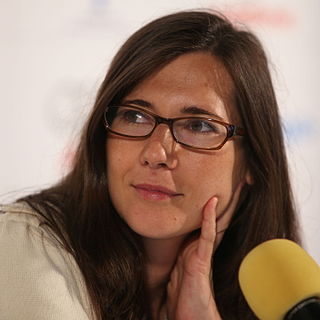A Quote by Tama Janowitz
I don't want my novel to be like Madame Bovary, finely crafted with the life edited out of it. I want my novel to be like a friend telling me a story -- so we go off on thoughts; that's the way it is.
Related Quotes
I always think about the books I'm doing in pretty much the same way. I'm simply trying to write that particular novel as well as that particular novel can be written. I want to listen to what it is telling me, trying to figure out what it wants to do as much as what I want to do with it. There's a negotiation that's constant and ongoing between me and the material I'm working with, because I'm trying to listen to it.
It's very bad to write a novel by act of will. I can do a book of nonfiction work that way - just sign the contract and do the book because, provided the topic has some meaning for me, I know I can do it. But a novel is different. A novel is more like falling in love. You don't say, 'I'm going to fall in love next Tuesday, I'm going to begin my novel.' The novel has to come to you. It has to feel just like love.
You know, there’s a philosopher who says, “As you live your life, it appears to be anarchy and chaos, and random events, non-related events, smashing into each other and causing this situation or that situation, and then, this happens, and it’s overwhelming, and it just looks like what in the world is going on ? And later, when you look back at it, it looks like a finely crafted novel. But at the time, it don’t.
A novel is what you dream in your night sleep. A novel is
not waking thoughts although it is written and thought
with waking thoughts. But really a novel goes as
dreams go in sleeping at night and some dreams are like
anything and some dreams are like something and some
dreams change and some dreams are quiet and some dreams
are not. And some dreams are just what any one would
do only a little different always just a little
different and that is what a novel is.
When I'm awake, I don't want to go to sleep. I don't want the hassle of turning the light off, putting my head down and then all the thoughts. I don't want al those thoughts... thoughts feed on thoughts feed on thoughts feed on thoughts feed on thoughts and I'm: 'I don't want this'. I have to knock myself out to go to sleep.
When you go through life ... it all seems accidental at the time it is happening. Then when you get on in your 60s or 70s and look back, your life looks like a well-planned novel with a coherent theme ... Incidents that seemed accidental, pure chance, turn out to be major elements in the structuring of this novel. Schopenhauer says, 'Who wrote this novel? You did.'
When I'm awake, I don't want to go to sleep. I don't want the hassle of turning the light off, putting my head down and then all the thoughts. I don't want all those thoughts... thoughts feed on thoughts feed on thoughts feed on thoughts feed on thoughts and I'm: 'I don't want this'. I have to knock myself out to go to sleep.
When you take a child who's hollering like hell, sit him on your knee, and say "once upon a time", you stop him hollering. As long as you go on telling him a story, he will listen. Novelists who neglect this fundamental effect do so at their peril. They become what is known as the experimental novelist, and an experimental novel is not really a novel at all.
Objectifying your own novel while writing it never really helps. Instead, I guess while you're writing you need to think: This is the novel I want to write. And when you're done you need to think: This is what the novel I wanted to write feels like and reads like and looks like. Other people might call it sweeping or small, but it's the book you chose.






































